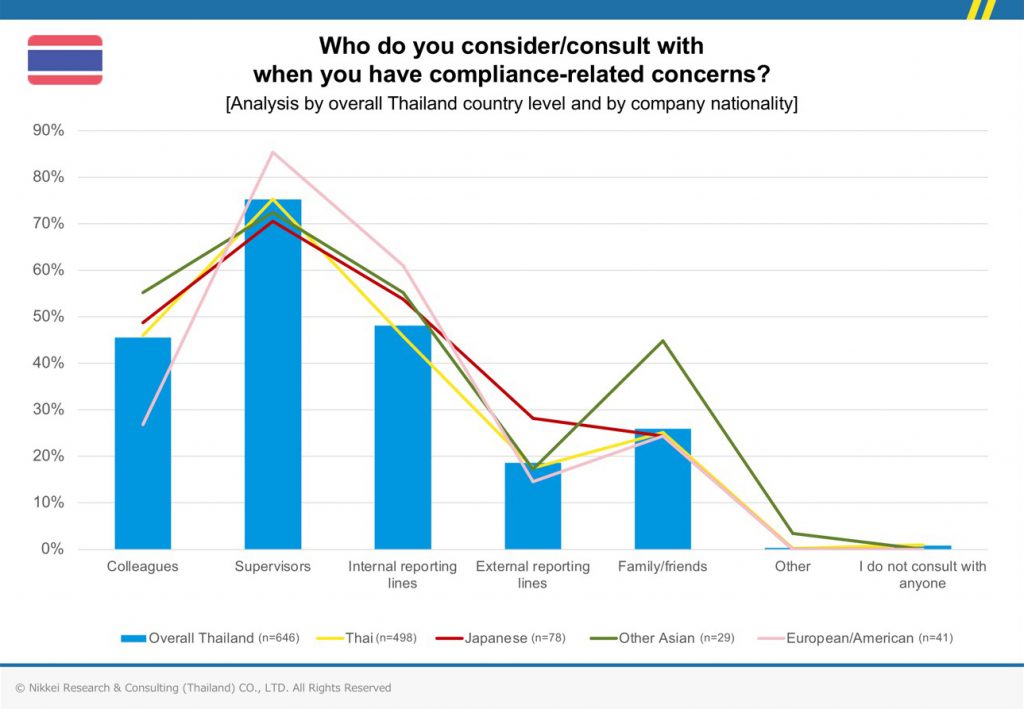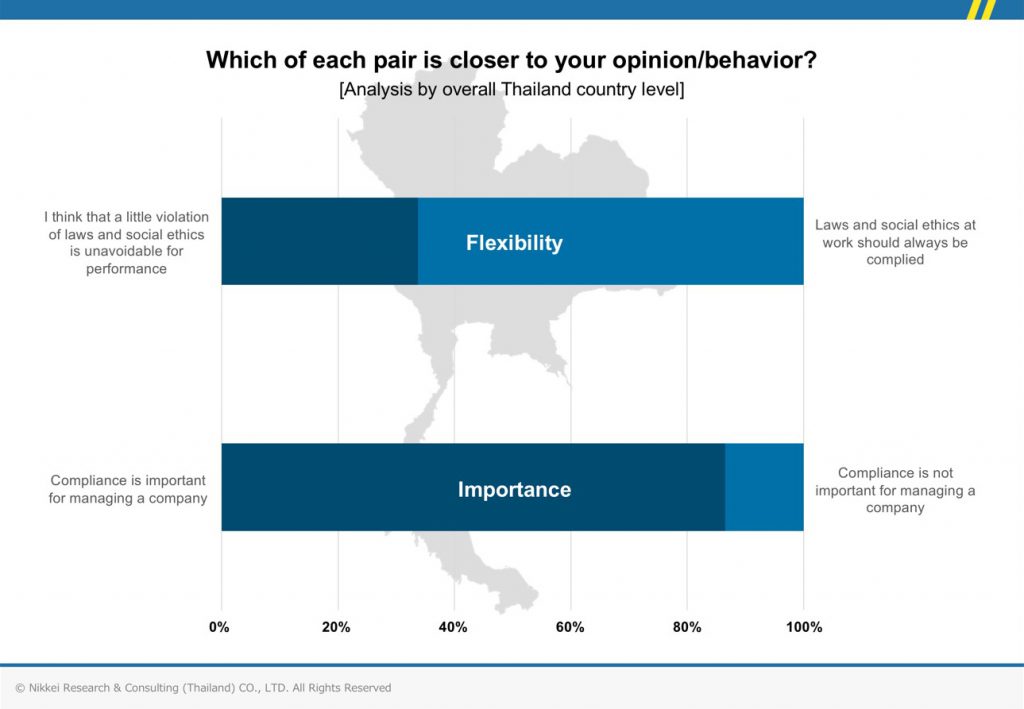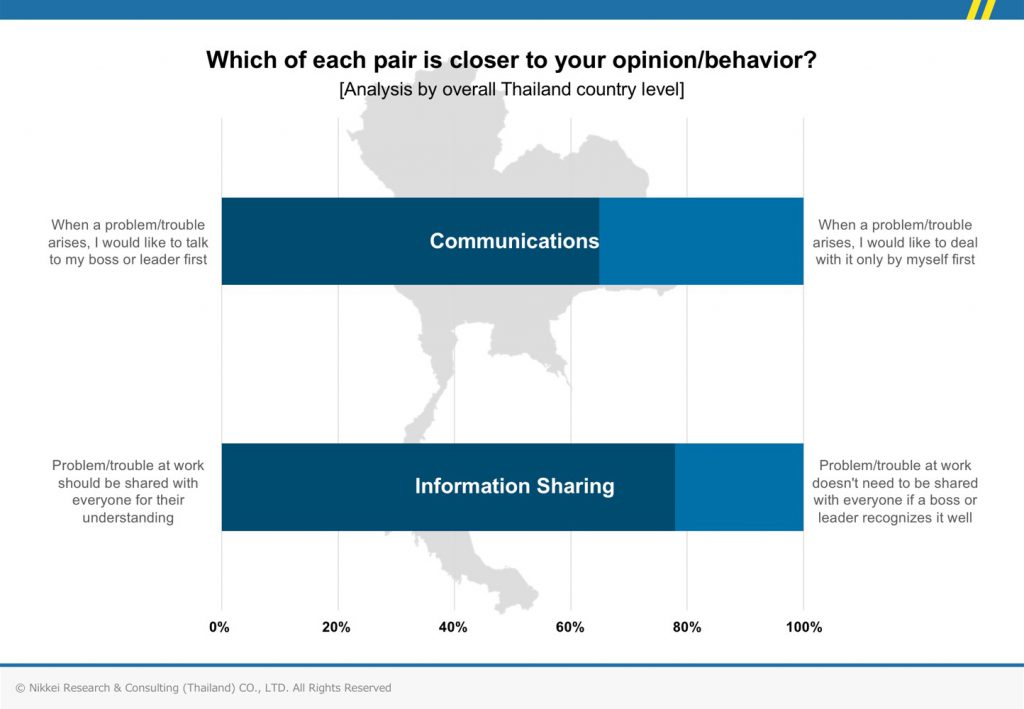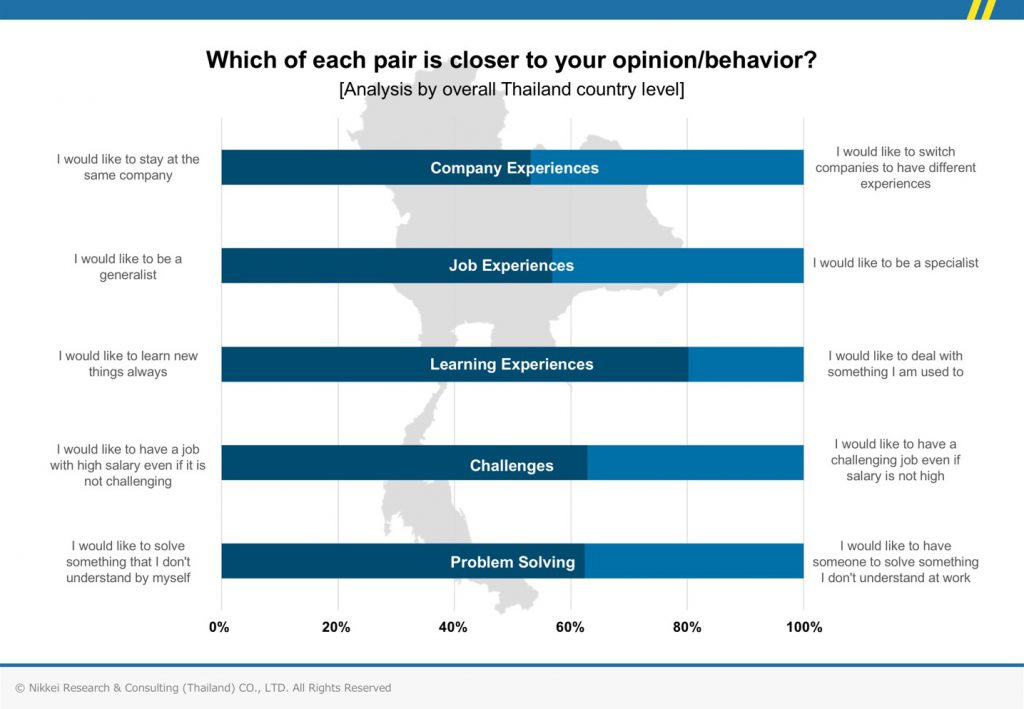In our previous article, we looked at current key issues, initiatives already implemented, and main priorities of companies in Thailand regarding corporate compliance. In this final episode of our corporate compliance series, we will look at people-related aspects, their preferences in dealing with compliance-related issues, and how companies can take action to prevent serious violations or risks. Once again these results are from our Nikkei Research & Consulting (Thailand) online survey* on corporate compliance practices of companies Thailand and Japan.

People
When employees come across compliance-related concerns, who do they think about or choose to consult with? The following are responses from Thai employees of different company nationalities in Thailand.

The most commonly considered person for consultation was their supervisor, also potentially including supervisors of their supervisors, at 75.2%. Thai employees of European/American nationality companies mentioned supervisors the most (85.4%) amongst the different company nationalities, while Thai employees in Japanese companies gave the lowest percentage for this source (70.5%). The least mentioned overall was external reporting lines, such as agencies and lawyers at 18.6%. Most company nationalities reported similar percentages, with employees of Japanese nationality companies ranking this channel the highest (28.2%). Another significant difference was seen in Other Asian companies (excluding Thai and Japanese) who choose to share with family/friends more than in other companies (44.8% compared to 25.9% for Thailand overall).
Preferences
We also looked at individual preferences regarding how to handle different issues at workplace. How do Thai employees prefer to handle issues that arise?

We provided two distinct choices on a variety of different scenarios. Looking at two final employee perspectives towards compliance, in terms of attitudes towards flexibility, slightly more than one-third of employees (33.7%) believe that a little violation of laws and social ethics is unavoidable in order to achieve performance compared to those who believe that laws and social ethics must always be complied (66.3%). When looking at attitudes towards importance, slightly less than one-seventh of employees (13.5%) feel that compliance is not important for managing the company. Interestingly, for companies with over 5000 employees, this number comes down to just 4.2% saying that compliance is not important. Looking at this from different generations’ perspectives, those in their 20’s was the age group with the highest percentage viewing compliance as not important (18.6%).
While both these numbers are on the minority side, they are important indicators of potential risk. Companies should aim to get this proportion down to as low as possible, as such attitudes may become shared beliefs if other employees start to take a more relaxed attitude towards potential compliance risks.
Next, we looked at knowledge management preferences, in terms of communications and information sharing.

On communications preferences, when a problem or trouble arises the majority of Thai employees prefer to talk to their boss or leader first (64.9%) rather than deal with it only by themselves. Looking at this in a little more detail, Thai employees in their 30’s were most likely to consult with seniors first (70.6%) while those in their 50’s were least likely (56.8%).
At the team level, employees agreed that information sharing about problems/troubles should be provided to everyone for their understanding (77.9%) and not just let it be an issue that the boss or leaders need to recognize. Both of these numbers seems to suggest that employees expect everyone to be involved – they believe everyone should know what is going on even on issues not directly related to them.
Finally, we asked about the preferred working style and experiences of employees regarding their role and responsibilities, to understand some basic attitudes of Thai employees towards work.

Regarding company experiences, employees were nearly evenly split between staying with the same company or switching in order to have different experiences (53.1% versus 46.9%). Those in their 20’s would most like to switch companies (51.3%) while those in their 50’s gave the lowest score (38.6%). Those in their 30’s were exactly at the overall average (46.9%) while those in their 40’s preferred to switch a little bit more (49.4%). Also, females seemed to want to switch companies slightly more compared to their male counterparts (49.2% versus 44.4%). It’s possible that while changing companies definitely would provide opportunities for new experiences, employees may prefer to stay with their current companies as long as they still have opportunities to learn and grow throughout their careers, or simply decide so because they realize that staying is easier if considering efforts required to learn new job and build new human relationship in a new workplace.
Regardless of wanting to stay with just one company or working at many companies, employees were in agreement in preferring general job experiences in various departments or projects (56.8%) rather than working as a specialist. Always having learning experiences for new things at work (80.2%) was also a major preference stated by employees.
However, when given a choice between higher salary or higher challenging job, employees preferred the stability of income (62.8%) even if the job remains stable and less dynamic. Looking at the data by age group, employees in their 20’s had higher salary preference the most (69.9%). Those in their 30’s and 40’s were quite close to the average score (62.4% and 64.6% respectively). Lastly, those in their 50’s preferred higher salary the least (53.0%) and evaluated higher challenge more importantly. The differences within these age groups suggests different priorities at different stages of each employees’ life. While the youngest age group seems to be motivated mainly by money, it’s also encouraging to see that nearly one-third (30.1%) still value challenging jobs more than just the financial aspect.
Finally, regarding problem solving preferences, on issues they did not previously understand employees preferred to try to solve the issue by themselves (62.4%) rather than have someone else solve the issue. While most age groups were similar percentages, employees in the 30 year old range had the lowest percentage (55.7%). This could be due to transitions in roles and responsibilities. As employees get promoted into people management roles, they may be more likely to delegate responsibilities to their staff and solve problems through others more. For new managers in your organization, it is encouraged to provide sufficient on-boarding and development support to help them ease into this new position successfully.
Prevention
Regardless of company nationality, business type, or industry, corporate compliance is fundamentally a people-related issue. Companies need to create the proper awareness and understanding through education and training. They also need to be aware of issues that may currently occur within the organization, both obvious as well as those less easily seen. And companies need to understand the preferences of its employees, regarding who they feel comfortable confiding with, as well as how they would like to manage different experiences at work.

Preventing seemingly small issues from turning into big compliance risks can be summarized by focusing on three key c’s – culture, communications, and channels.
Culture provides the foundation for trust and openness. Companies need to create a culture where employees are encouraged to do the right thing by the right way. Also, having a culture where employees report a difficulty or mistake immediately before it becomes more serious or hidden. Even when mistakes are made, such cases are used as learning experiences, with any necessary feedback fairly assessed. Companies enhance their culture by emphasizing your mission, vision, and core values more during internal activities and operations. For those who do not have such business philosophies currently in place or are looking to revise/update these guiding beliefs, methodologies such as employee surveys, performance coaching, 360-degree assessments, or team-building workshops can also be utilized.
Communications is also a fundamental necessity. Good communication between supervisors and staff, between staff and staff, and between cross-functions are necessary to ensure that everyone is aware and involved in issues that are important for managing the company properly. Every issue does not need to be resolved by everyone together, but everyone needs to be involved in every issue, in order to learn together, to learn from the past, and to learn the best way towards the future.
Finally, sufficient channels are required for collecting and managing compliance-related information. Companies need understand employees’ preferences and provide the proper channels, such as through subject matter experts or independent external research agencies. Knowing what is going is the first step to taking corrective actions, by understanding the situation correctly in order to customize further training contents and activities to match your current context.
Final Thoughts
Throughout our corporate compliance series, we’ve taken an in-depth look at our survey findings to analyze how aware employees are of corporate compliance issues, their perceptions, and their current level of understanding. Furthermore, we’ve seen what issues, initiatives, and priorities are top of mind for companies and their employees. And last but not least, we’ve looked at the people aspect needs, their preferences, and ways that companies can prevent potentially serious damage.
Companies should focus on three key areas in order to strengthen this aspect of their business:
- Create a culture that views corporate compliance as an important and fundamental part of work and workplaces. Leverage your mission, vision, and core values to guide desired attitudes and behaviors.
- Conduct sufficient communications regarding expectations. Regular evaluation, as well as well on-going education and training support are necessary in order to reduce any gaps that may exist.
- Make sure there are sufficient channels to collect and report factual information so that employees can confidently voice their concerns. Utilize both internal as well as independent external sources to gather as much knowledge as necessary.
Companies with strong corporate compliance practices are better positioned for long-term success and sustainability. Also, based on the different roles in your organization and the different generations expected to fulfill these roles, make sure to recruit and motivate your employees based on these unique needs. Learn more about your company’s current compliance readiness and employee attitudes and intentions, by finding ways to collect insights and conduct in-depth research into these critical issues. To find out more about how your organization can better enhance these capabilities, please check out our employee research page and feel free to contact us to discuss in more detail.
従業員・コンプライアンス調査に関する日本語ページは、こちらからご覧ください。
* Nikkei Research & Consulting (Thailand) online research survey conducted during January 2020 with full-time employees of companies in Japan (n=579 nationwide) and Thailand (n=646 Bangkok metropolitan area).



